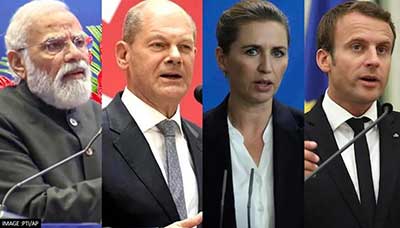Relevance: GS-2: Bilateral, regional and global groupings and agreements involving India and/or affecting.
Key Phrases: Inter-Governmental Consultations, democratic values, multilateral institutions, Green Strategic Partnership, Make in India, Nordic countries, Wassenaar Arrangement, UNSC 1267 Sanctions Committee.
Why in News?
- Recently Prime Minister has travelled to Germany, Denmark and France. His first foreign trip this year comes at a time when a war in the heart of Europe has upended seven decades of global order.
Germany
- Historical Background
- Germany is one of India’s most important partners in Europe, with deep bilateral relations, and also because of its key role in the European Union. India was among the first countries to establish diplomatic ties with the Federal Republic of Germany after WWII.
- India and Germany have had a ‘Strategic Partnership’ since May 2000, and it has been strengthened with the launch of the Inter-Governmental Consultations (IGC) in 2011 at the level of heads of government.
- India is among a select group of countries with which Germany has such a dialogue mechanism. During Prime Minister’s visit, the 6th IGC has taken place, postponed from last year due to the pandemic.
- Germany has made key strategic choices in the Russia-Ukraine war. It has promised to reduce its energy dependence on Russia and decided to increase defence spending — a significant move, given its post-WWII posture.
- Importance of Recent visit to Germany
- With India too dependent on Russia for defence supplies, it is important for New Delhi and Berlin to exchange notes on strategic choices — and move away from Russia for their respective needs.
- Germany holds the G-7 Presidency, and with India taking a different view from Europe’s by not condemning Russia directly, it will be significant to see if India gets invited to the G-7 outreach summit in June.
- India and Germany have a shared interest in upholding democratic values, a rules-based international order, and reform of multilateral institutions.
- China’s assertiveness in the Indo-Pacific region is another area for discussion.
Denmark
- Bilateral relations were elevated to the level of a “Green Strategic Partnership” during the Virtual Summit held in September 2020 between the Indian Prime Minister and Danish PM.
- Importance of recent visit to Denmark
- Nordic countries are pioneers in innovation, clean energy, green technologies, education, health care, human rights, and rule of law — this presents enormous opportunities for India to expand its strengths by collaborating with these countries.
- It makes sense to step-up engagement, as India today represents a fast-growing economy with annual GDP growth of 7-7.5% over the last few years.
- India presents an ideal opportunity to these countries because of its large market. Many new flagship schemes have been launched by India — like Make in India, Smart Cities Mission, Start-up India, Clean Ganga etc — in which Nordic countries can take an active part and provide their expertise.”
India-Nordic Summit:
- The first India-Nordic Summit took place in April 2018 to explore new areas of cooperation. This format is special; the only other country with which the Nordic countries — Sweden, Finland, Norway, Denmark, and Iceland — have this kind of engagement is the US.
- While economic growth, climate change and global security were identified as key areas of cooperation, the summit is taking place at a time when two Nordic countries are looking at joining NATO, amid a sense of insecurity in Europe.
France
- Historical Background
- India and France have traditionally had close relations. In 1998, the two entered into a Strategic Partnership, with defence & security cooperation, space cooperation and civil nuclear cooperation being its pillars.
- India and France also have a robust economic partnership and are increasingly engaged in new areas of cooperation.
- France was among the few western countries to not condemn India after the 1998 Pokhran tests. It has continued to support India’s claim for permanent membership in the United Nations Security Council.
- France’s support was vital in India’s accession to the Missile Technology Control Regime, Wassenaar Arrangement and Australia Group.
- France continues to support India’s bid for accession to the Nuclear Suppliers Group.
- Following the Pulwama attack in February 2019, France nationally listed the Pakistan-based ‘global terrorist’ Hafiz Saeed, which was followed up with his listing at the UN.
- France has also supported India’s requests to block attempts by Pakistan to enlist Indian citizens under the UNSC 1267 Sanctions Committee.
- Importance of Recent visit to France
- The current visit has allowed the two leaders to exchange notes on the Ukraine crisis, China’s assertiveness in the Indo-Pacific, and defence and security cooperation including the delivery of Rafale aircraft.
- The conversation with France was important since it is holding the Presidency of the European Union this year.

Conclusion:
- Prime Minister’s recent visit signifies the importance attached to India’s ties with Europe. For the past few years, Europeans have always felt that — as a whole — the present government gives more thrust to other strategic partners like the US, Japan and even Australia and the UAE, than Europe.
- Over the last few weeks, the intensity of engagement has increased in the wake of the war in Ukraine, with foreign ministers from the UK, Poland, Portugal, Luxembourg, Netherlands, and Norway among others and the President of the European Commission visiting India.
- The current visit to Europe is likely to set the stage for the India-EU summit and a boost to Free Trade Agreement negotiations, which have been ongoing for a decade and a half now.
Sources: The Indian Express
Mains Question:
Q. Briefly discuss the significance of the prime minister’s recent visit to Europe ? (150 words)








